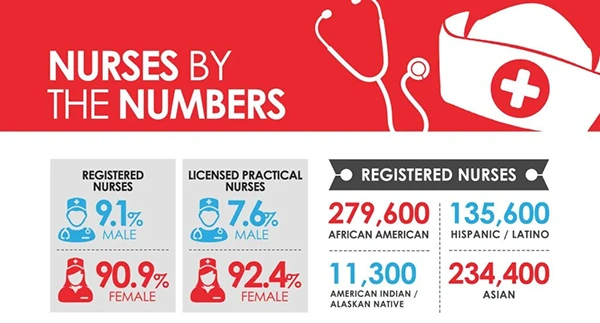
Picking on a career can be a tough choice for anyone. There are so many jobs out there that are fulfilling and fun, but there are also some that can be just as demanding.
Nursing is one such job. It can be a pretty demanding and tiring job, but it can also be pretty rewarding. You get to help people while they are going through the toughest times of their lives.
So, if you’re one of those people who is thinking of getting into nursing, you’ve made the right choice. But there is one thing, you cannot just decide one day and get straight into nursing.
You need a degree to prove that you’ve learned the special skills and techniques that make nurses such good caregivers.
In this blog post, we will take a look at the ideal degree paths you can choose if you’re thinking of becoming a nurse.
Traditional Education Path
If you’re thinking of going the traditional route, most people start out by seeking their undergraduate degrees. They enroll as a college freshman and take a combination of prerequisites and nursing classes.
The more they advance through the program, the more healthcare-specific their classwork becomes.
Eventually, they will also have to do clinical work. During this period, they will do rotations throughout various hospital floors so they can get a sense of the many different types of jobs nurses perform.
The “traditional” nursing education path typically takes four years. After that point, graduates can pursue nursing work after they fulfill all of their license requirements.
DID YOU KNOW?
The average time between completing an associate degree and a master’s degree in nursing is 11.5 years, and 12.5 years from associate to doctorate. The average time between completing a bachelor’s and master’s degree is 8.2 years, and 12.4 years from bachelor’s to doctorate.
But What If You Already Have a Degree?
In a sense, you’re pivoting after all. Probably the very last thing you’ll want to do is start over as a college freshman again.
If you happen to have a college degree already, it might not be necessary to go through all that again. The extent to what you must accomplish may vary depending on your educational background.
Most people with a good transcript on a four-year program will be able to skip all of their gen-eds.
From there, they may be eligible to pursue what is known as an “accelerated program.” These degree paths allow students to get certified in 12-18 months instead of four years. They are intense and may equate to what feels like a full-time job.
They do, however, have the benefit of getting you into a new career a lot faster. If you don’t already have an undergraduate degree, you will unfortunately not be eligible for this option.
Bundle Your Learning
Some options allow students to combine undergraduate and graduate studies to get both degrees in around four years. These “direct to hire” programs give your career a big jump start.
It might take a little bit longer to get your degree but you will also have the opportunity to skip entry-level work for higher-paying jobs.
Nurse practitioners— a position available only to those with a graduate degree—earn six figures and can sometimes perform almost all of the same responsibilities as a doctor.
Direct-to-hire programs are intense but they allow you to save money—particularly if you were planning on getting a graduate degree at some point down the line.
Online Degrees
Many people are surprised to learn that they can get a nursing degree while pursuing most of their learning from home.
Online programs are widely recognized and more accessible for many people who are trying to pivot into a new career.
Online degrees:
- Are cheaper: Some programs can cost as little as half the price of a traditional degree.
- Flexible: Many allow you to work at your own pace, taking pre-recorded lessons that offer the same instruction you would receive in the classroom.
- Fully legal: Provided you do proper research, your online degree will make you just as eligible as one earned at a brick-and-mortar university.
It is important to make sure that the school you choose is accredited, and has a strong reputation for supporting its students.
Keep in mind that getting a degree is not enough. You also need to be able to pass all of the certification requirements upon graduation. A solid education will help you do that.
Note also that online programs will require you to get in-person practical experience. Make sure that the programs you choose have a cooperative relationship with the hospitals in the neighborhood.

There are over 5.5 million nurses and nurse aids in the United States, making them more than the population of 30 states and 5 times the size of the US Army. This number includes 2,824,641 registered nurses (RNs) and 690,038 licensed practical nurses (LPNs). Nurses save lives and are some of the hardest-working individuals in the workforce.
What All Nursing Students Have to Do
No matter what program you choose, you will need to take the NCLEX after graduation. This test is the last thing standing between you and your dream career. Most people do pass it on their first try—something to the tune of 80%–but those who do still struggle with it.
What’s more, pass rates can range pretty widely between institutions. Some schools are well-known for doing an excellent job of preparing people for the NCLEX. Others have pretty poor pass rates.
As you get closer to the end of the program, think about checking out all the resources your school has to help you prepare for the exam. Many will have special test prep materials—even practice exams—that should prepare you for what to expect.
Don’t be afraid to wait a bit after you’ve completed graduation before taking the test. While it may be tempting to take it the first day you are eligible, failing will set you back further.
Those who don’t pass on their first try may need to wait as long as two months before they can try again.
I Want to Work in a Specialty Nursing Field. Do I Need a Special Degree?
Probably not. Most nursing careers begin with a standard BSN. From there, you may need to meet additional certification requirements. Many of these can be earned through practical experience or by taking short-term classes.
Some positions will require you to get a master’s degree. Most notable among these is the job of a nurse practitioner. Even for these jobs, however, you must start with a BSN and work your way up from there.
Bottom line? Nurses all start at the same spot. However, they can wind up anywhere.
There are dozens—maybe hundreds—of things you can do with a degree in nursing. Once you graduate, look for careers that you are passionate about.
And even if healthcare is hard, there is enough variety to make sure that no one has to settle for a career that doesn’t make them happy.
Conclusion
Nursing is one of the most rewarding and hardest jobs out there. No matter if you’re thinking of starting on this career path or changing from your present one to this one, there are special degrees and courses that you need to complete.
In this blog post, we have listed the degrees and certifications you’ll need to become a certified nurse.